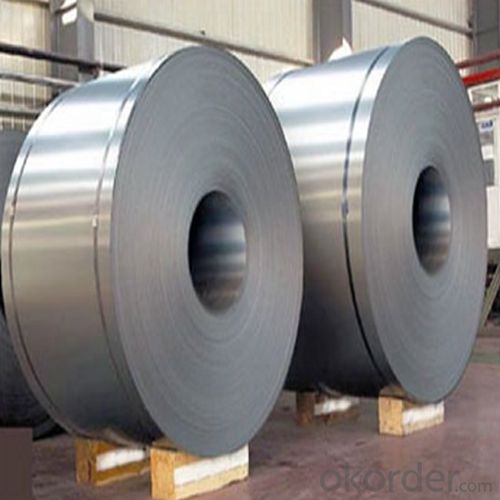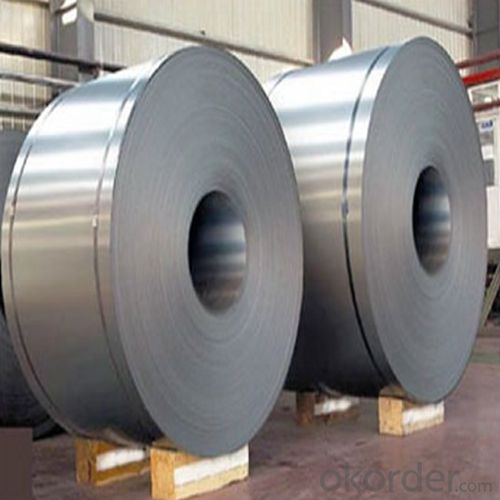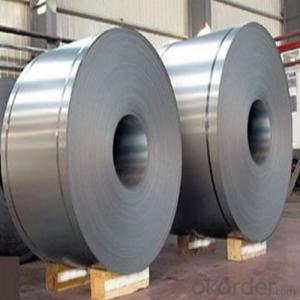Stainless Steel Coil in Hot Rolled Cold Rolled 0.3mm
- Loading Port:
- Guangzhou
- Payment Terms:
- TT OR LC
- Min Order Qty:
- 25 m.t.
- Supply Capability:
- 8000 m.t./month
OKorder Service Pledge
OKorder Financial Service
You Might Also Like
1.Structure of Stainless Steel Coil:
Stainless steel coil is a production which not easy rust, acid resistance and corrosion resistance, Stainless steel coil is a new kind of Austenite stainless steel by used Mn, N replace Ni. so it is widely used in light industry, heavy industry, daily necessities and the decoration industry. Stainless steel coil has good corrosion resistance and hot / cold processing performance, instead of stainless steel products for used in the not high of corrosive environment, such as indoor, inland city outdoor etc.
2.Main Features of the Stainless steel coil:
1) High Quality: Using Latest automated control equipment to ensure the quality
2) Best Price: With most automated equipments to ensure our price is lower than the market
3) Fast Delivery: The delivery date within 20 das after get your order
4) Best Service: Our after-sell service team will help you to slove all the problems about the order
3. Stainless steel coil Images


4. Stainless steel coil Specification
Product name: 304 Stainless Steel Coil
Thickness: 0.2mm to 1.5mm
Technical: Cold Rolled
Width: 10mm to 1240mm
Type: 200 Series
Length: As customer's requested
Standard: JIS, SUS
Finish: BA, 2B, 8K, NO.3, NO.4, HL
MOQ: 100 MT
Ship Term: FOB Shenzhen port or CNF import port
Delivery Time: 15 to 20 day after the receive the deposit or LC
Packaging: By wooden pallet, wooden case or according to customer's request
5.FAQ
We have organized several common questions for our clients,may help you sincerely:
1) How about your company?
2) A world class manufacturer & supplier of castings forging in carbon steel and alloy steel,is one of the large-scale professional investment casting production bases in China,consisting of both casting foundry forging and machining factory. Annually more than 8000 tons Precision casting and forging parts are exported to markets in Europe,America and Japan. OEM casting and forging service available according to customer’s requirements.
3) How to guarantee the quality of the products?
4) We have established the international advanced quality management system,every link from raw material to final product we have strict quality test;We resolutely put an end to unqualified products flowing into the market. At the same time, we will provide necessary follow-up service assurance.
5) How long can we receive the product after purchase?
6) In the purchase of product within three working days, We will arrange the factory delivery as soon as possible. The pecific time of receiving is related to the state and position of customers.Commonly 7 to 10 working days can be served.
- Q:What are the factors that affect the quality of steel coils?
- The quality of steel coils can be influenced by various factors. To begin with, the composition of the steel itself plays a vital role in determining its quality. Impurities like sulfur or phosphorus can have a negative impact on the strength, durability, and overall performance of the steel. Additionally, the quality of the steel is affected by its carbon content, alloying elements, and heat treatment. Furthermore, the quality of the steel coils is greatly affected by the manufacturing process and techniques utilized during production. Factors such as the cleanliness of the production environment, the precision of the rolling and cooling processes, and the control of temperature and pressure throughout manufacturing all contribute to the final quality of the coils. Additionally, the surface quality of the steel coils is a crucial factor. Any defects or imperfections on the surface, such as scratches, dents, or corrosion, can compromise the integrity and functionality of the coils. It is essential to handle, store, and transport the coils properly to maintain their surface quality. Moreover, the mechanical properties of the steel coils, including tensile strength, yield strength, and elongation, are essential indicators of their quality. These properties depend on various factors, such as the type of steel, its thickness, and the processing conditions. Lastly, external factors such as environmental conditions, like humidity and temperature, can affect the quality of steel coils. Exposure to moisture or extreme temperatures can lead to corrosion or other forms of degradation, impacting the overall quality and lifespan of the coils. In conclusion, the quality of steel coils is influenced by several factors, encompassing the composition of the steel, the manufacturing process, surface quality, mechanical properties, and external environmental conditions. It is crucial to carefully control and monitor these factors to produce high-quality steel coils that meet the desired specifications and standards.
- Q:I was wondering if anyone knew the grade/type of steel for this product. I'd like to use it as stock for a knife blade, but would like to know the specs so I can determine if it is suitable and, if so, how best to heat treat it.Thanks.PS: I know it isn't stainless, but that leaves a lot of other steel types.
- 1018 mild steel. Not suitable for bladesmithing. If you can't heat treat find an old file, grind it out (keep it cool) and put in an oven 400F. Modern car/truck springs are 5160 med chrome steel, a good blade quality steel and forgiving on the anvil/heat treat.
- Q:What are the different types of steel coil surface coatings?
- Steel coils can be enhanced in terms of durability, corrosion resistance, and aesthetic appearance through the use of various types of surface coatings. The most commonly employed coatings are as follows: 1. Zinc Coatings: These are widely utilized to safeguard steel against corrosion. A layer of zinc is applied to galvanized steel coils, acting as a barrier against moisture and other environmental elements. 2. Galvannealed Coatings: This type of coating combines zinc and iron, providing improved corrosion resistance and enhancing paint adhesion. It is ideal for applications that require painting. 3. Aluminum Coatings: Aluminum coatings are employed to achieve a lightweight and corrosion-resistant surface. Steel coils coated with aluminum are frequently utilized in the automotive industry for body panels and other parts that require high strength and corrosion resistance. 4. Organic Coatings: Organic coatings, typically in the form of paint or powder coatings, offer protection against corrosion. They also provide a wide range of color options for aesthetic purposes. In the construction industry, they are commonly used for roofing and cladding applications. 5. Metallic Coatings: Metallic coatings such as tin, nickel, and chromium can be applied to steel coils to confer specific properties, such as improved electrical conductivity, increased hardness, or enhanced resistance to wear and tear. 6. Ceramic Coatings: Ceramic coatings are employed to achieve high-temperature resistance and thermal barrier properties. They find application in situations where steel coils are exposed to extreme heat or in industrial processes that require thermal insulation. Each type of coating possesses unique properties and advantages, and the selection of a suitable coating depends on the specific requirements of the application. Manufacturers and engineers carefully consider factors such as cost, durability, corrosion resistance, and aesthetic appeal when deciding on the appropriate coating for steel coils.
- Q:What are the different types of corrosion protection methods used for steel coils?
- There are several types of corrosion protection methods used for steel coils, including: 1. Coating: Applying a protective layer of paint or coating, such as epoxy or zinc, on the surface of the steel coil to prevent direct contact with moisture and corrosive substances. 2. Galvanization: Immersing the steel coil in a bath of molten zinc to create a protective zinc coating, which acts as a sacrificial layer that corrodes first before the steel. 3. VCI (Volatile Corrosion Inhibitors): Using volatile chemicals that release protective vapors, which form a thin layer on the steel coil's surface, inhibiting corrosion by blocking moisture and oxygen. 4. Passivation: Treating the steel coil with chemicals like nitric acid to remove impurities, creating a passive oxide layer that protects against corrosion. 5. Cathodic Protection: Connecting the steel coil to a sacrificial anode (usually made of zinc or magnesium) or using impressed current to provide a flow of electrons, which prevents corrosion by making the steel coil the cathode in an electrochemical cell. 6. Environmental Control: Maintaining controlled temperature, humidity, and atmospheric conditions during storage and transportation to minimize exposure to corrosive elements. These methods can be used individually or in combination, depending on the specific requirements and environmental conditions.
- Q:How are steel coils coated for specific applications?
- Steel coils are coated for specific applications through a process called coil coating. This involves applying a protective layer of paint, polymer, or other coatings onto the steel coils using methods like roll coating or spray coating. The coating is carefully selected based on the desired properties such as corrosion resistance, durability, or aesthetic appeal required for the specific application.
- Q:PLEASE PLEASE PLEASE!!!!!!!! HELP MEEEEEEEE!!!!!!! I need to know how can i prevent steel from rusting when it is exposed to water or salt water or vinegar. PLEASE TELL ME A LOT OF WAYS THAT I COULD PREVENT IT!!!!!!!!!!!!!!!!!!!!!!!!!!!!!!!!!!!!!!
- steel that will not rust is called Stainless Steel. Exposure to oxygen causes rust. In stainless steel is heated and all the oxygen burnt out of it. I would go with a high grade (there are multiple grades) of stainless steel
- Q:How are steel coils inspected for bendability?
- Steel coils are inspected for bendability through a combination of visual examination, mechanical testing, and dimensional analysis. Visual inspection involves identifying any visible defects such as cracks, dents, or surface irregularities that could affect the coil's bendability. Mechanical testing is conducted to measure the coil's resistance to bending and evaluate its flexibility. This includes performing bend tests to determine the coil's ability to withstand a specified degree of bending without breaking or cracking. Additionally, dimensional analysis is performed to ensure that the coil meets the required thickness, width, and length specifications, as these factors also impact its bendability.
- Q:What are the common sizes of steel coils used in the industry?
- The common sizes of steel coils used in the industry vary, but some of the standard sizes include 0.4mm, 0.5mm, 0.6mm, 0.7mm, 0.8mm, 1.0mm, 1.2mm, 1.5mm, 2.0mm, and 2.5mm. However, it's important to note that different industries may have specific requirements and may use custom sizes depending on their applications.
- Q:What are the different types of steel coil grades and specifications?
- In the market, one can find a variety of steel coil grades and specifications. These grades and specifications cater to different industry needs and applications. Several commonly used types include: 1. Hot Rolled Steel Coils: These coils are manufactured by heating the steel above its recrystallization temperature and then rolling it at a high temperature. They are often used in applications where dimensional accuracy and surface finish are not crucial. 2. Cold Rolled Steel Coils: Cold rolled steel coils are produced by subjecting hot rolled coils to further processing in cold reduction mills. This process enhances surface finish, tightens tolerances, and increases strength compared to hot rolled coils. They find wide applications in the automotive, construction, and electrical industries. 3. Galvanized Steel Coils: These coils are coated with a layer of zinc to protect them from corrosion. Galvanization improves the durability and longevity of the steel coils. They are commonly used in roofing, fencing, and automotive body parts. 4. Stainless Steel Coils: Made from a combination of iron, chromium, and other elements, stainless steel coils offer excellent corrosion resistance and high strength. They are widely used in industries such as food processing, chemical, and medical, where hygiene and corrosion resistance are critical. 5. High-strength Low-alloy (HSLA) Steel Coils: HSLA steel coils are designed to possess higher strength and improved formability compared to conventional carbon steels. They are commonly employed in structural and transportation applications where weight reduction and high strength are required. 6. Electrical Steel Coils: Also known as silicon steel or transformer steel, these coils are specifically designed for electrical equipment like transformers, motors, and generators. They exhibit low core losses and high magnetic permeability, ensuring efficient energy transfer. 7. Tool Steel Coils: Tool steel coils are specially formulated to possess high hardness, wear resistance, and toughness. They are commonly used in the production of cutting tools, dies, and molds. These examples represent only a fraction of the steel coil grades and specifications available in the market. The choice of the appropriate grade and specification depends on specific application requirements, such as strength, corrosion resistance, formability, and surface finish.
- Q:What is the accuracy of steel tape inspection?
- The project is through the detection of steel tape, steel tape each batch have the error him different, so do projects each into a batch of steel tape has to go through the inspection department, let this batch of steel tape has reached the same error range. All the measuring tools in this project are unified into these steel tape measures, so that the measurement error is guaranteed.
1. Manufacturer Overview |
|
|---|---|
| Location | |
| Year Established | |
| Annual Output Value | |
| Main Markets | |
| Company Certifications | |
2. Manufacturer Certificates |
|
|---|---|
| a) Certification Name | |
| Range | |
| Reference | |
| Validity Period | |
3. Manufacturer Capability |
|
|---|---|
| a)Trade Capacity | |
| Nearest Port | |
| Export Percentage | |
| No.of Employees in Trade Department | |
| Language Spoken: | |
| b)Factory Information | |
| Factory Size: | |
| No. of Production Lines | |
| Contract Manufacturing | |
| Product Price Range | |
Send your message to us
Stainless Steel Coil in Hot Rolled Cold Rolled 0.3mm
- Loading Port:
- Guangzhou
- Payment Terms:
- TT OR LC
- Min Order Qty:
- 25 m.t.
- Supply Capability:
- 8000 m.t./month
OKorder Service Pledge
OKorder Financial Service
Similar products
New products
Hot products
Hot Searches
Related keywords





























